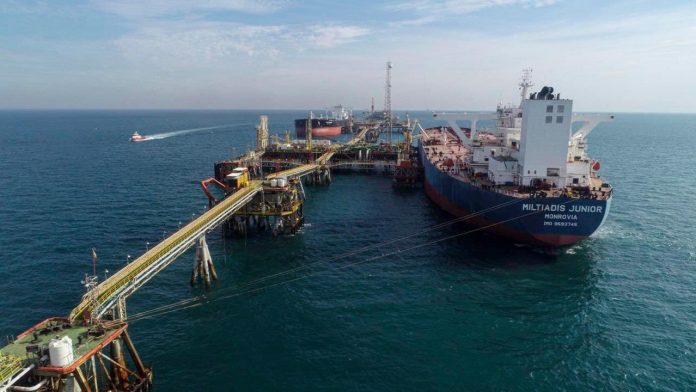The US confirmed it confiscated almost a million barrels of crude oil from Iran that was allegedly bound for China, according to TheEpochTimes.
In April, the United States seized a shipment of crude oil belonging to the Islamic Revolutionary Guard Corps (IRGC), a designated foreign terrorist organization. On September 8, the Ministry of Justice officially confirmed this. In confirming the seizure, the department also announced its first criminal resolution involving the illicit sale and transport of Iranian oil, which is in violation of U.S. sanctions. The announcement reads:
“This is the first-ever criminal resolution involving a company that violated sanctions by facilitating the illicit sale and transport of Iranian oil and comes in concert with a successful seizure of over 980,000 barrels of contraband crude oil.”
Unsealed court documents showed that in April the United States seized from the tanker Suez Rajan contraband cargo that the IRGC allegedly sold to China.
On April 19, the vessel’s owner, Suez Rajan Limited, pleaded guilty to conspiring to violate the International Emergency Economic Powers Act (IEEPA) in smuggling the sanctioned Iranian crude oil. Under a plea agreement, the company agreed to pay a $2.4 million fine and face three years of corporate probation.
Greek shipper Empire Navigation, the operating company of the Suez Rajan, agreed to cooperate and transport the Iranian oil to the United States at its own expense, a task that has since been completed. The Justice Department claimed:
“The contraband cargo is now the subject of a civil forfeiture action in the U.S. District Court for the District of Columbia, The United States’ forfeiture complaint alleges that the oil aboard the vessel is subject to forfeiture based on U.S. terrorism and money laundering statutes.”
According to the U.S. Treasury, Iran’s oil smuggling revenue supports the Quds Force, an elite unit within the IRGC that operates across the Middle East. Some groups linked to Iran’s IRGC and the Quds Force of secretly selling and shipping Iranian oil to China were accused in the complaint.
The accusations were based on satellite images, as well as documents, to allege that the Suez Rajan attempted to disguise its acquisition of Iranian crude oil from one tanker by falsely claiming it received the oil from a different tanker. They allegedly hid the oil’s origin through methods including ship-to-ship transfers, as well as masking the locations and identities of the vessels involved via false reporting and false documents. The complaint also alleged that the vessel’s charterer used the U.S. financial system to facilitate the transportation of the oil.
The tanker was in the South China Sea near Singapore’s northeast coast for several months, before sailing for the Texas coast. The vessel transferred its cargo to another tanker, which released its oil in Houston in recent days.
For a long time, the United States did not give any comments about the further fate of this vessel. However, the Justice Department on Sept. 8 confirmed the U.S. government had seized the oil.
The Suez Rajan eventually headed to the United States, Iran seized two tankers in late April—the Advantage Sweet flying the Marshall Islands flag, heading towards the United States in the Gulf of Oman, and the Niovi owned by Greece traveling from Dubai to Fujairah. In response, the U.S. Navy condemned Iran for its “continued harassment of vessels and interference with navigational rights in regional waters.”
The U.S. military in early July said it stopped two more Iranian attempts to seize commercial tankers in the Gulf of Oman. That same month, the top commander of the IRGC’s naval arm threatened further action against anyone offloading the Suez Rajan with Iranian state media linking the recent seizures to the cargo’s fate. Late on Sept. 6, the United States updated its warning to shippers traveling through the Middle East, saying:
“Commercial vessels transiting through the Persian Gulf, Strait of Hormuz, and Gulf of Oman continue to be illegally boarded and detained or seized by Iranian forces.”
Having the fourth largest oil reserves, Iran’s economy is heavily dependent on oil sales. However, since 2018, sanctions have significantly reduced its ability to produce oil to near full capacity.
This year, Iranian oil exports have mostly been above 1 million barrels a day despite U.S. sanctions, according to the commodity data firm Kpler. In May and June, it went above 1.5 million barrels a day, with figures in August sitting at 1.4 million barrels daily, Kpler’s data showed. China is believed to be a major buyer of Iranian oil, likely at a significant discount.
